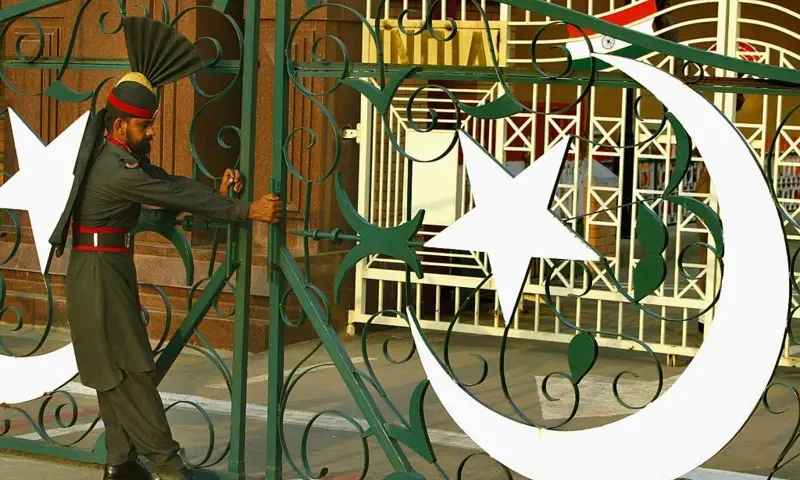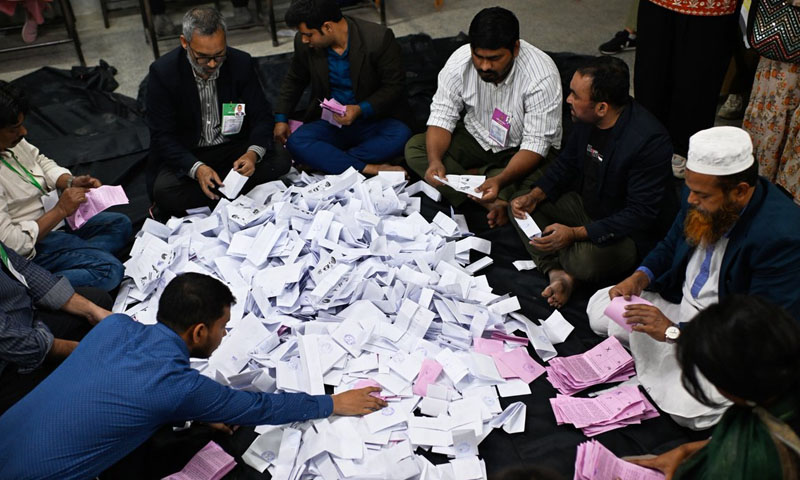- Web Desk
- 7 Hours ago
Wagah border closure: who will pay the higher price?
-

- Web Desk
- Apr 27, 2025

ISLAMABAD: Following the attack in Pahalgam, in Indian Illegally Occupied Jammu and Kashmir, on April 22 that claimed the lives of 26 people, India has taken a series of extraordinary measures against Pakistan. These include the suspension of the Indus Waters Treaty, the closure of the Wagah-Attari border, the withdrawal of visas for Pakistanis and the severing of diplomatic relations.
In response, Pakistan also announced several measures, including the suspension of all bilateral agreements with India — including the Simla Agreement.
Moreover, Pakistan has closed its airspace and borders to India, suspended trade, banned the use of its airspace for Indian flights, and imposed several diplomatic restrictions in retaliation.
Pakistan, like India, has asked Indian defence attachés and their advisers to leave the country and limit the size of the diplomatic staff.
Explaining the decisions taken during a high-level security cabinet committee meeting, Indian Foreign Secretary Vikram Misri said that a decision had been taken to immediately close the Attari-Wagah border.
The meeting also reviewed all aspects of the Pahalgam attack and possible retaliatory actions.
Although the Modi government has not directly blamed Pakistan yet, it has stated that the “links of the Pahalgam attack are connected across the border.”
In his press conference, Vikram Misri announced that the visa facilities under the SAARC agreement for Pakistani citizens would also be revoked, and all Pakistani nationals currently in India have been ordered to leave within 48 hours.
This press conference was held after the cabinet committee meeting, and journalists were informed that they would not be allowed to ask questions afterward.
‘India Will Suffer More’
Following the increased tensions after the Pahalgam attack and the severance of trade ties between Pakistan and India, both countries are expected to suffer economic losses.
However, it is important to note that bilateral trade between the two countries was already minimal, largely due to ongoing tensions.
Trade relations were limited, with only a few products being exchanged.
Pakistan’s Trade Development Authority Chief Executive Zubair Motiwala told BBC Urdu that trade ties between Pakistan and India were not very significant to begin with.
He said, “Not much was being exported from Pakistan to India, so the suspension of trade relations will not have a major impact on Pakistan’s external trade.”
He further explained, “India used to send raw materials for pharmaceuticals to Pakistan, as India is a major global supplier of pharmaceutical raw materials. Pakistani pharmaceutical companies were importing these from India.”
Motiwala said that with the halt of imports from India, Pakistan will now have to procure this raw material from other countries, which will be more expensive, potentially leading to a rise in medicine prices.
Similarly, Pakistan imported a small amount of cotton from India.
Motiwala said that while Pakistan will suffer minor losses due to the trade cut-off, India will face a larger setback, particularly in the Afghan market, because Indian goods were being exported to Afghanistan via Pakistan — a route now closed.
He added that now India will have to send its goods to Afghanistan through Iran by sea, which will increase costs significantly.
Additionally, he pointed out that the closure of Pakistan’s airspace to Indian passenger aircraft will cause substantial financial losses to Indian airlines.
Dr Abdul Khan from the Sindh University of Urology said that some patients from Pakistan used to go to India for medical treatment, especially in traditional medicine fields where India has an advantage. However, now, with the suspension of visa services, this will also negatively affect India.
Trade through Wagah
After India’s actions, Pakistan also announced a complete halt to trade with India, stating that no trade would take place with India even through third countries.
What is the current trade situation between the two countries? Who is selling what to whom, and how is this happening? How will the decisions of both governments impact each country?
This checkpoint is also known as the “Attari Land Port.” It is India’s first land port, located just 28 kilometers from Amritsar. This port is India’s only land route for trade with Pakistan and Afghanistan.
Trade relations between Pakistan and India were severed when, on August 5, 2019, the Modi government revoked the special status and autonomy of Jammu and Kashmir under its administration.
Due to the Kashmir dispute, diplomatic and trade ties between the two countries have remained strained.
It is worth noting that after the Pulwama attack in February 2019 in Indian-administered Jammu and Kashmir, India also revoked Pakistan’s Most Favoured Nation (MFN) status.
Uncertainty over Goods from Afghanistan
According to official figures, in 2023–24, trade worth approximately 3,886 crore Indian rupees was conducted through Attari. Additionally, 71,563 people crossed the border through this route.
In 2017–18, the figures were higher, with about 4,148 crore rupees in trade and 80,314 people crossing.
Now, due to the decisions of both governments, the movement of goods and people will come to a halt.
Will goods from Afghanistan be brought to India through another route? There is still uncertainty regarding this.
In 2021, the Taliban seized power in Afghanistan. Even before that, goods were being transported by air to promote trade between India and Afghanistan.
In 2023, Indian Foreign Minister Dr S Jaishankar said that trade between India and Afghanistan was continuing, with Iran’s Chabahar Port also playing a role.
Traders in Indian Punjab Respond
In Indian Punjab, World MSME Forum in Ludhiana President Badesh Jindal said that India’s exports to Pakistan mostly reach by sea rather than through the Attari checkpoint.
He said that the dry fruits India imports from Afghanistan would no longer be able to come through Attari.
He said, “We may have to pay a higher price for these, but we want the government to pressure Pakistan to stop terrorist activities.”
Rajdeep Uppal, former president of the Confederation of Indian Industry (CII) Amritsar Zone said: “We support the Indian government’s decision. Anyway, since 2019, trade between India and Pakistan through Attari has been almost non-existent. Goods from Afghanistan come via Pakistan.”
He added, “We should increase our trade with Afghanistan and Central Asian countries via sea routes.”
Volume of India-Pakistan Trade
According to this year’s official figures from the Modi government, India has exported goods worth more than 3,833 crore rupees to Pakistan so far.
India exports items like pharmaceuticals, sugar, and auto parts to Pakistan.
In 2023–24, India exported goods worth 10,096 crore rupees to Pakistan and imported goods worth 25 crore rupees.
After a steady decline between 2018–19 and 2020–21, trade between the two countries had shown some growth in recent years.
Still, apart from Afghanistan, Pakistan is the South Asian country with which India has the least trade.
In February 2024, Federal Minister Piyush Goyal stated in the Lok Sabha:
“In August 2019, Pakistan took several steps to reduce bilateral relations with India, including suspending trade. However, later, their Ministry of Commerce allowed the export of only medical products.”
Although he did not specify a particular route, generally, the Attari-Wagah Border and Karachi Port serve as two major trade routes between India and Pakistan.
‘Pakistan Was Already Buying Very Little from India’
Land Port Authority of India’s former chairman Anil Kumar Bamba said that “Pakistan was already buying very little from India. Goods going to Pakistan from Attari mainly included fresh vegetables, fruits, and clothes, which were not very high-value. Sometimes we bought stones and cement from them.”
He added, “High-value goods and medicines were transported via sea routes. Many goods from India went to Dubai first and then to Pakistan. I believe that besides Attari, other channels might remain open because Pakistan needs them more than we do.”
According to him, the closure of Attari would mainly affect ordinary citizens of Pakistan.
When there were no direct flights between India and Pakistan, thousands of people used to cross the border on foot via Attari.
Trade Diverted via Third Countries
Trade expert Ajay Srivastava said that due to obstacles in official channels, an estimated 85,000 crore rupees worth of trade between India and Pakistan now occurs through re-exports via the UAE or Singapore.
It is believed that Pakistan imports many products from India through this route.
Conversely, India imports salty snacks, almonds, and dates from Pakistan, which come via third countries.
While formal trade stops due to border closures, demand remains unchanged.
Impact of Past Political and Diplomatic Conflicts
Pakistani economist Dr Ikramul Haq told BBC Urdu that bilateral trade between India and Pakistan has previously been disrupted by political and diplomatic conflicts — citing the 2009 Mumbai attacks and the 1999 Kargil War.
However, he noted that trade had resumed at various times afterward.
Before 2019, Pakistan was importing cotton, organic chemicals, plastics, machinery, and equipment from India, while India was importing fruits, minerals, soda ash, salt, and other items from Pakistan.
Dr Uzma Zia, a senior researcher at the Pakistan Institute of Development Economics, said both countries have shown little interest in managing trade crises arising from political disputes.
She said, “Even now, the situation is that bilateral trade relations are practically over.”
Pakistan had granted India transit access for goods arriving from Afghanistan but had not given India similar access for goods traveling to Afghanistan.
Lost Potential of Regional Trade
According to trade expert Iqbal Tabish, neighbouring countries around the world have the greatest potential for trade because it is cheaper and mutually beneficial.
However, ongoing conflicts have prevented this between Pakistan and India, even though India and China continue to trade over $100 billion annually despite tensions, and a similar situation exists between China and Vietnam.




